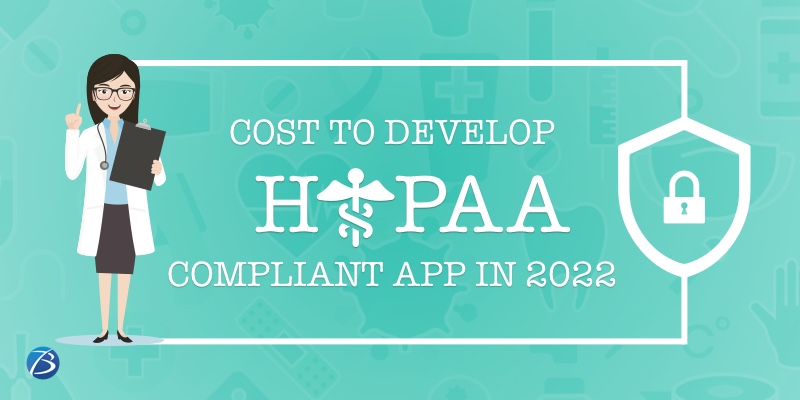How Much Does It Cost to Develop a HIPAA Compliant Application in 2022?

Introduction: HIPAA Compliant Application
If you are a healthcare provider and have a mobile application that deals with protected health information (PHI), then your app would have to be HIPAA compliant.
Well, collecting information does not require you to be compliant, but sharing the information requires you to be.
Importance: HIPAA Compliant App Development in 2022
So, if you are planning to craft a healthcare mobile application that involves PHI, make sure that it is a HIPAA app.
A HIPPA-compliant application refers to a software solution that meets the standards set by the US Health & Human Services, A HIPAA compliant mobile app ensures that the user data you hold is secured.
Most entities in Healthcare IT Services that collect and share patient information are concerned about HIPAA since non-compliance can turn out to be a costly affair.
Hospitals & companies violating HIPAA compliance attract a heavy fine that could even run into millions of dollars – there have been several instances of hospitals being levied a heavy penalty for data breaches.
The HIPAA Compliance & Its Costs
If you are planning to develop a HIPPA-compliant healthcare app, you should first evaluate what levels of HIPAA compliance you need. This will depend on the PHI (data) you hold and the amount of the data you are sharing. The lesser the
sharing, the lesser the compliance.
If you are getting the app developed through a healthcare application development company, then the app
development company should be informed about HIPAA right in the development stage because they have to work on privacy & security rules.
The cost of developing a HIPAA compliant app generally depends on factors like
- The type of the healthcare Organization
- The size of the organization
- The Organization Culture
- Geographic Location of the healthcare body
- The number of Business Associates involved
For a small-sized covered entity (covered entity: doctors, hospitals, insurance companies, clinics, etc.), the HIPAA compliant app development cost would be somewhere around: $4,000 to $12,000. This cost includes Risk
Management & Management Plan, Remediation, and Training & Development Policy.
For a medium or large-scale covered entity, the cost of building a HIPAA compliant app would be approximately $50,000 or more. This cost includes Remediation, Risk Analysis & Management Plan, Penetration Testing,
Training, and Policy Development & Vulnerability Scans.
Alternative Option:
If the app development cost seems way too higher, the other option available is resorting to a cloud service provider, which is already HIPAA-compliant.
When choosing a cloud-based service provider, you need to check if that service provider will minimize the risk of data breaches, and whether the service provider is ready to serve you.
Although the costs of developing a mobile application that is HIPAA-compliant seem higher, it is always better to be on the safer side and avoid paying large penalties. These compliance errors are apparently too costly to be made.
Conclusion:
The penalties for security breaches are heavy due to the nature of the data that is being dealt with. Patient information is very sensitive in nature as it contains their medical history. In 2017, IBM & Ponemon conducted research
that gave away some interesting facts.
They found out that on average, a single data breach costs $380 per record, which is 250% more than the data breach across other industries around the globe.
A HIPAA compliant app is trusted by patients as such an app keeps their information private & secure. If you would like to develop a new-era HIPAA compliant app for your medical facility, reach out to Biz4Solutions, a prominent mobile app development companythat specializes in healthcare app development. We are having a rich experience
of 12+ years in tailoring highly customized HIPAA compliant healthcare apps/solutions for our global clientele.


